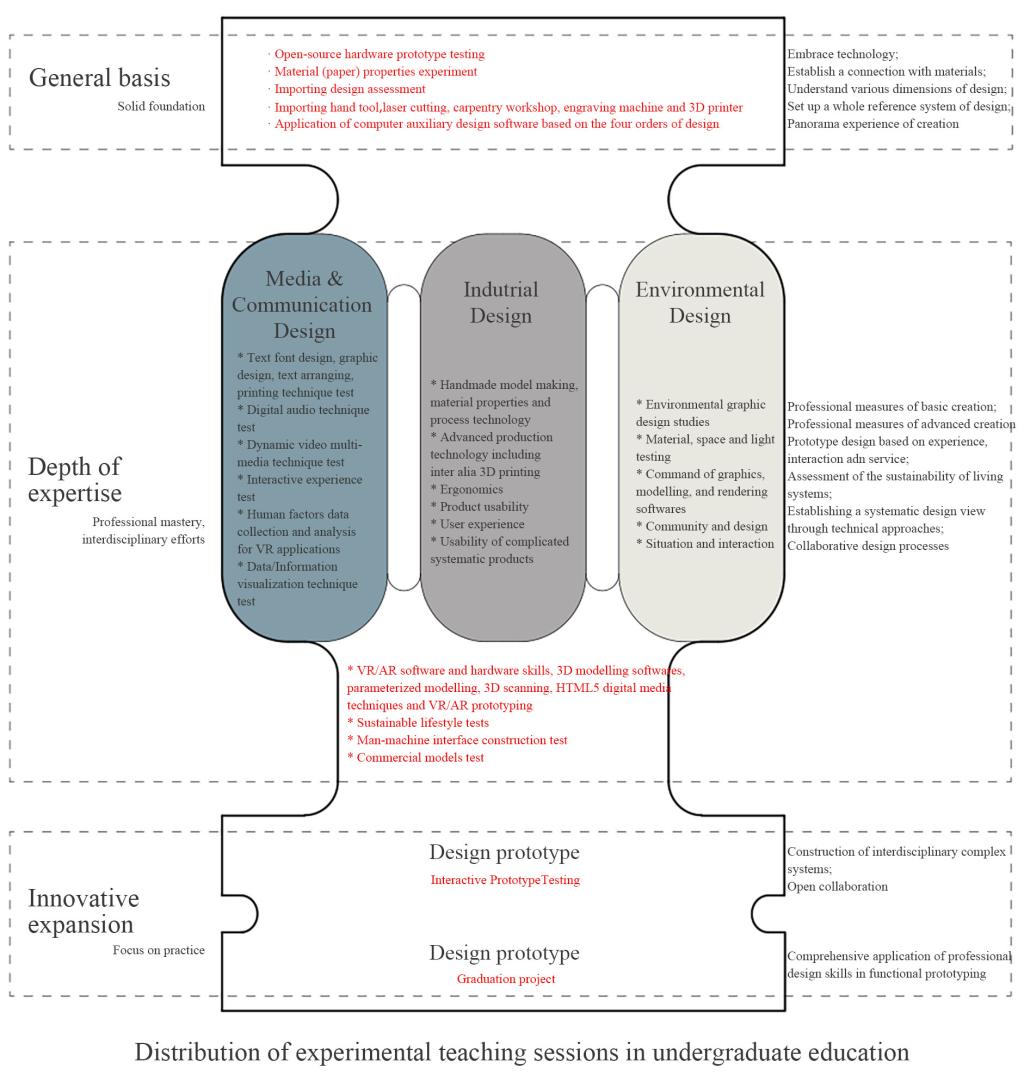Teaching System

Under the guidance of the experimental teaching concept of combining vertical and horizontal competence, theory and practice, tradition and openness, the Innovation Field established an experimental teaching system (shown in picture above) that covers “solid foundation, professional mastery, interdisciplinary efforts and focus on practice” under the T-shaped framework of undergraduate, master’s and doctoral design and innovation education. The core of the system is to improve the integration of horizontal knowledge while deepening vertical professional ability, constantly linking the two to form an experimental teaching system of cross-growth. The system can be divided into three levels according to the different aspects of experimental teaching:
1.General basis
General education as a basis aims at the acquisition of common basic professional skills, with foundational design experiment courses closely integrated with theory learning, to consolidate the foundation of design studies. The first year of experimental teaching in the College of Design and Innovation is based on generalized basic education, in which students of industrial design, product design, visual communication design (including digital media design) and environmental design learn together the general knowledge needed for professional design, and receive training in basic design skills such as design thinking, shape creation, design expression, and using open source hardware and software. The goal of this stage is to ensure students’ proficiency in the operation of various devices and command of basic program principles and interaction methods, thus laying a solid foundation for the development of experimental skills in subsequent stages. The experimental courses in this stage are conducted mainly through teacher-led experimental teaching.
2.Depth of expertise
The second stage focuses on the progressive strengthening of vertical professional competence, while emphasizing the accumulation of horizontal knowledge and the formation of design methods. Students of different majors learn the basic and advanced creation and construction methods of their majors from their second year, build prototypes based on experience, interaction, and service, and establish systematic design view through technical approaches. While training students by majors, at least one or two comprehensive experimental courses are available each year for all majors in the College, encouraging students to think broadly and comprehensively, to gather inspiration from real life, to conduct collaborative design and improve practical skills. At this stage, the experimental courses comprise mainly teacher-led experimental teaching, but start also to introduce student-led open experiments.
3.Innovative expansion
The innovation development stage aims to stimulate students’ innovative potential by training innovative thinking and creation, which is mainly concentrated in the fourth year of undergraduate studies, including various kinds of professional experiments driven by experimental courses, specific practical course design, graduation design, innovation training projects, innovation and entrepreneurship competitions, involving themes such as healthcare, urban-rural interaction, mobility and transportation, intelligent and sustainable living, industrial transformation etc. Students are encouraged to use cross-disciplinary means of constructing complex systems and professional design techniques to build various functional prototypes. Experimental courses at this stage mainly focus on student-led open and comprehensive experiments, and effectively enhance students; independent innovative competence through various types of innovative experiments.
No.281 Fuxin Road Yangpu District,Shanghai
Email:dioffice@tongji.edu.cn
Tel./Fax.:+86 21 65983432
Tongji University College of Design and Innovation
Copyright ©2020

Scan on WeChat